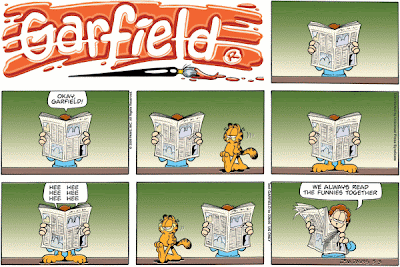 One of the things that makes Peanuts so great is how relatable it is. In today's reprint from 1962, for example, we can relate to Linus because, while we've probably never been blown over by a Beagle, we have all had our assumptions and expectations unexpectedly overturned.
One of the things that makes Peanuts so great is how relatable it is. In today's reprint from 1962, for example, we can relate to Linus because, while we've probably never been blown over by a Beagle, we have all had our assumptions and expectations unexpectedly overturned.But there's other stuff going on here, too. The characters are (obviously) very well-defined, and their interaction is realistic within the world of the strip. The drawing, meanwhile, is expressive and sufficiently illustrates the absurdity of the joke.
 In Zits, the characters are somewhat less well-defined, being at times little more than broad archetypes. In this strip, Jeremy isn't really a specific character so much as a stand-in for every teenage male everywhere; the same goes for Connie, who is just a stand-in for every mother of a teenage male everywhere.
In Zits, the characters are somewhat less well-defined, being at times little more than broad archetypes. In this strip, Jeremy isn't really a specific character so much as a stand-in for every teenage male everywhere; the same goes for Connie, who is just a stand-in for every mother of a teenage male everywhere.As such, the strip has a tendency to lean a bit too heavily on relatability, which is the case here. The drawings, however, are often very well done, which is also the case here. While the joke isn't really anything special, basically just amounting to "Kids sure do eat a lot, don't they?", the image of Jeremy detaching his jaw and swallowing an entire ham in the second panel is funny enough that the lazy premise gets a pass.
 I'm not generally in the target audience for Cathy, but I can relate to this particular strip. And that's a good thing! But it's still not funny.
I'm not generally in the target audience for Cathy, but I can relate to this particular strip. And that's a good thing! But it's still not funny.The problem is that merely being relatable isn't enough. The characters in Cathy, like the characters in Zits, tend toward the archetypal. (The other big working woman comic, Sally Forth, actually has far better characters, despite being written by a man.) Cathy Guisewite's drawing, meanwhile, just isn't expressive or absurd or, just in general, good enough to be funny on its own. And so there's a lot of times when all the strip has to recommend it is its relatability. Which very nearly makes it Pluggers for working women. And that's not a good thing to be.
 Because as much as I thoroughly despise Pluggers' self-congratulatory blue-collar populist bullshit, that's not its biggest problem. Pluggers' biggest problem is that it's basically relatability porn, so much so that it's actually written by the readers. The characters are not even archetypes, but instead completely blank slates onto which the readers are to graft themselves. And the drawing rarely has anything to recommend it; the characters exist as animals, for example, but for no good reason.
Because as much as I thoroughly despise Pluggers' self-congratulatory blue-collar populist bullshit, that's not its biggest problem. Pluggers' biggest problem is that it's basically relatability porn, so much so that it's actually written by the readers. The characters are not even archetypes, but instead completely blank slates onto which the readers are to graft themselves. And the drawing rarely has anything to recommend it; the characters exist as animals, for example, but for no good reason.Today's installment isn't a great example for making this point. The joke is actually decently constructed, and the dog-husband's mortified facial expression is almost sort of amusing. As such, it's probably the best Pluggers comic I've ever seen. And, yeah, that's probably the faintest praise ever.
Of course, a lot of people like Pluggers. And a lot of people like Cathy. Because those comics are simple, and people understand them. Readers don't have to think about them or read them carefully or really even look at the drawings. And that's the problem. Relatability is a good thing, but using it as a crutch isn't. Doing so cheapens the relationship between the readers and the comics, turns it into something lazy and cheap and superficial. That's where Pluggers started, and where Cathy is at now, and where Zits could end up if its not careful. Peanuts never did give into that impulse. And that's another one of the things that makes it so great.




















